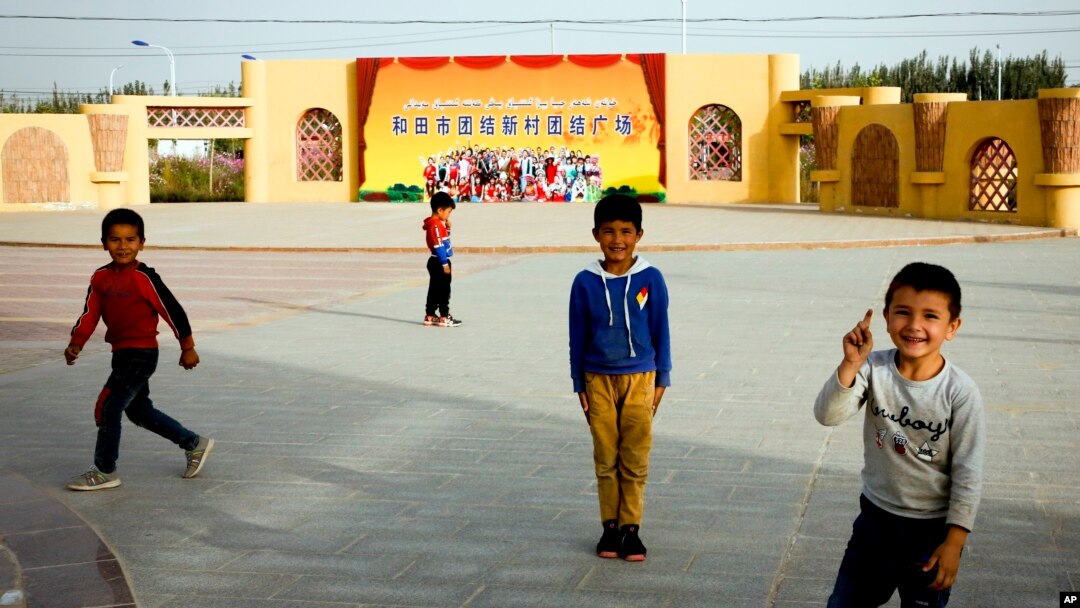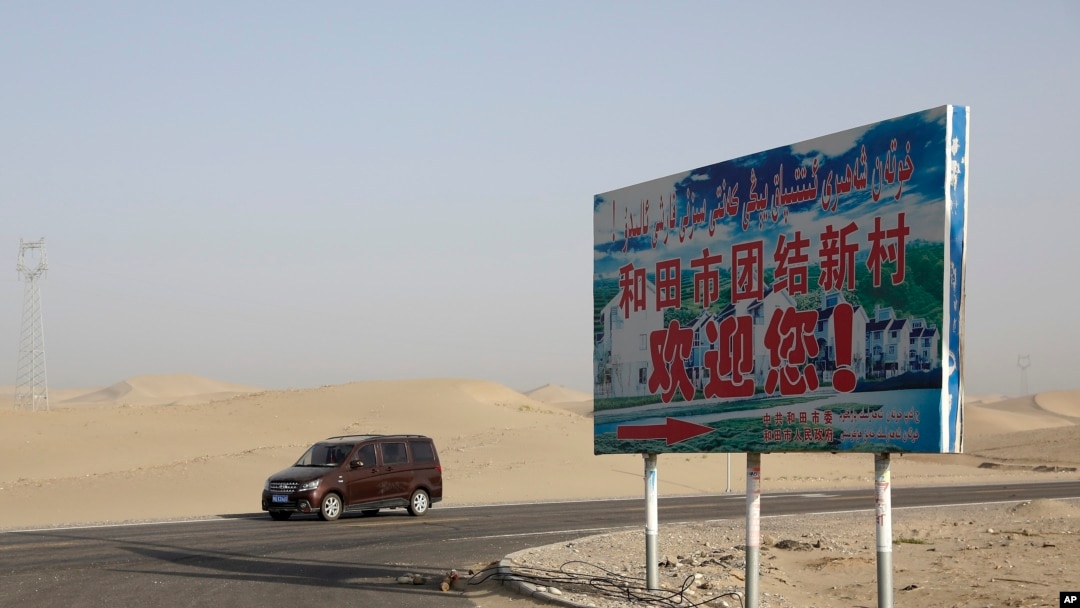A new report finds that the Chinese government has been systematically changing village names with cultural or religious significance to the Uyghurs in China’s Xinjiang autonomous region to Chinese names showcasing Chinese Communist Party ideologies.
The report, released Wednesday by Human Rights Watch and the Norwegian Uyghur organization “Uyghur Hjelp,” which co-authored the report, found that around 630 villages have seen elements of religion, Uyghur history, and Uyghur cultural practices, including a traditional Uyghur string instrument “dutar” and a shrine called “mazar,” removed from their village names.
Some analysts say the campaign is part of Beijing’s efforts to erase Uyghur culture and religious expressions. “This is a part of the serious abuses that are ongoing for the Uyghurs in Xinjiang,” Maya Wang, the Interim China Director at Human Rights Watch, told VOA by phone.
The Chinese government often uses Chinese phrases such as “happiness,” “unity,” and “harmony” to replace those Uyghur village names, according to the report.
“New village names are mostly in Mandarin Chinese and they denote a positive sentiment the government wants Uyghurs to embrace and express under the Chinese leadership,” the report wrote.
While authorities in Xinjiang continue to change some Uyghur village names, the report said the majority of the name changes took place between 2017 and 2019, which coincides with mass internment of Uyghurs across the region.
“Since 2017, Uyghur people’s expressions of who they are, their history, and how they came to be a group of people have been erased or manipulated,” Wang said, adding that Beijing’s goal is to force Uyghur people to conform to the rules they have laid out.

FILE - Uyghur children play at a square where a poster showing Han Chinese and Uyghurs posing together in a photograph with the words "Hotan City Unity New Village Unity Square" on display, at the Unity New Village in Hotan in western China's Xinjiang region on Sept. 20, 2018.
“If you practice something different, you could be labeled as an extremist and put under long imprisonment, so this is part of a wholesale erasure [of Uyghur culture and expression],” she added.
The report found that most villages that undergo name change are concentrated in prefectures that are predominantly Uyghur, including Aksu, Kashgar, and Hotan in Southern Xinjiang.
In response to findings from the report, the Chinese embassy in Washington D.C. said Uyghur culture has been “effectively protected and promoted.”
“Uyghur population in Xinjiang can use their ethnic language and road signs in Xinjiang are mostly in both Mandarin and Uyghur,” Liu Pengyu, the spokesperson of the Chinese embassy, told VOA in a written response.
In 2022, the U.N. high commissioner for human rights determined in a report that the Chinese government had committed human rights abuses against the Uyghurs and other Turkic Muslim minorities in Xinjiang that could constitute crimes against humanity.
SEE ALSO: UN Rights Chief: China’s Treatment of Uyghurs May Constitute Crimes Against HumanityAccording to U.N. estimation, at least one million Uyghurs and other Muslim minorities may have been interned in re-education camps by Beijing in Xinjiang since 2017, but China denied these allegations and claimed in 2019 that all Uyghurs in the camps had “graduated.”
Impact on the Uyghur community
As China continues to change some village names from Uyghur to Chinese, the report found that the campaign has seriously affected the Uyghur community. Based on interviews with 11 Uyghurs, the report found that the name change may increase the difficulty for some Uyghurs to find their villages while others may have difficulty registering for government services.
“Some Uyghurs outside Xinjiang feel like they can’t even recognize their hometown,” Abduweli Ayup, an exiled Uyghur linguist who co-authored the report, told VOA by phone.
The impact of the village name change is accompanied by the effect of Beijing’s mass detention of Uyghurs, mass surveillance of the Uyghur community, and other persecutions against the Uyghurs, including separation of families, forced labor, and sexual violence.
Some activists say all these efforts are part of the campaign that “targets everything that is of the essence’’ for Uyghurs.
“This village name change campaign makes some Uyghurs feel like they’re less than the Han Chinese because their culture is backward,” Zumretay Arkin, Director of Global Advocacy at World Uyghur Congress, told VOA by phone.
According to Arkin, other campaigns that Beijing has initiated to better assimilate the Uyghurs in the Han Chinese majority is to sinicize mosques across Xinjiang by removing the crescent and dome while replacing religious writings with an homage to the Chinese Communist Party.
In 2017, Human Rights Watch also found that Chinese authorities prohibited Uyghurs from using dozens of names with religious connotations common to Muslims around the world, claiming that using these names could “exaggerate religious fervor.”
What can the international community do?
Arkin said the Chinese government’s efforts to forcibly assimilate Uyghurs into the Han Chinese community have pushed Uyghurs to hide their identity and basic way of life. “For Uyghurs living in Xinjiang, they have to constantly hide their identity so they can fit into the mold that the Chinese government has created for them,” she told VOA.
Arkin said this trend has shifted the responsibility to preserve Uyghur cultural heritage to the diaspora community. “Since the diaspora community has been largely cut off from their family members and friends in Xinjiang, the responsibility of preserving the Uyghur culture has become a heavy burden for the diaspora community,” she said.
While the United Nations and foreign governments have condemned China’s systematic persecution of the Uyghurs and imposed targeted sanctions on Chinese officials, Human Rights Watch said these responses have been ineffective in affecting Beijng’s treatment of the Uyghur community.
Ayup urged foreign countries to try to increase pressure on Beijing during the upcoming UN Human Rights Council session.
“Concerned governments and the UN human rights office should intensify their efforts to hold the Chinese government accountable for their abuses in the Uyghur region,” Ayup told VOA, adding that one priority should be the release of the hundreds of thousands Uyghurs who are still detained in Xinjiang.


